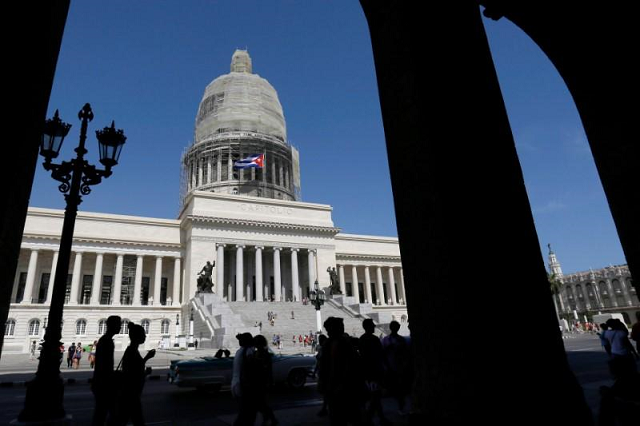Cuban diplomats at UN stage noisy protest at US event
The diplomats disrupted a meeting organised by the US on the plight of Cuban political prisoners

People walk in front of Cuba's Capitol, or El Capitolio, in Havana, Cuba, July 21, 2018. PHOTO: REUTERS
United States urges Cuba to free jailed dissident on hunger strike
The diplomats managed to drown out the US representative, Kelley Currie, during her remarks at the UN's Economic and Social Council, prompting her to demand that security guards remove them from the hall.
The diplomats shouted "Lift the blockade of Cuba!" and "Cuba yes, blockade no". One of the protesters slammed a large book on the tables while another used a wooden mallet to drown out the US diplomat.
"Can you please remove them from the room," Currie said, pausing during her remarks.
"I'm going to pause while security removes the disruptive elements from the room."
The US diplomat later told reporters that the Cuban representatives had behaved in a 'thuggish' manner that was "really shocking and disturbing."
"It makes you wonder that if the diplomats of this government behave this way, how do the police behave?" she said.
UN decries 'shameful' reprisals on rights activists in 38 countries
UN security guards repeatedly asked the diplomats to stop their protest, but they pressed on throughout the meeting.
The event entitled "Jailed for What?" was to draw attention to the plight of an estimated 130 political prisoners held in Cuba.
Cuban Ambassador Anayansi Rodriguez Camejo slammed the meeting as "political comedy," telling reporters that it was "based on fake arguments involving actors with dark pasts, at the service of a foreign power."
The ambassador had formally protested the meeting, sending a letter to UN Secretary-General Antonio Guterres requesting that it be canceled because it was in violation of UN rules about the use of its premises.
UN rules are vague and specify only that meetings and events held on UN premises must be "consistent with the purposes and principles of the United Nations" and be non-commercial.
The meeting came just weeks before the General Assembly is scheduled to hold its annual vote on ending the US embargo on Cuba, which last year was adopted by a vote of 191 to 2, with only the United States and Israel voting against.
In 2016, the US abstained, marking a major shift as the administration of former president Barack Obama worked to end decades of enmity with Havana.
This year, the vote will be closely watched to see if there will be abstentions from countries on the measure condemning the US embargo on Cuba.



















COMMENTS
Comments are moderated and generally will be posted if they are on-topic and not abusive.
For more information, please see our Comments FAQ